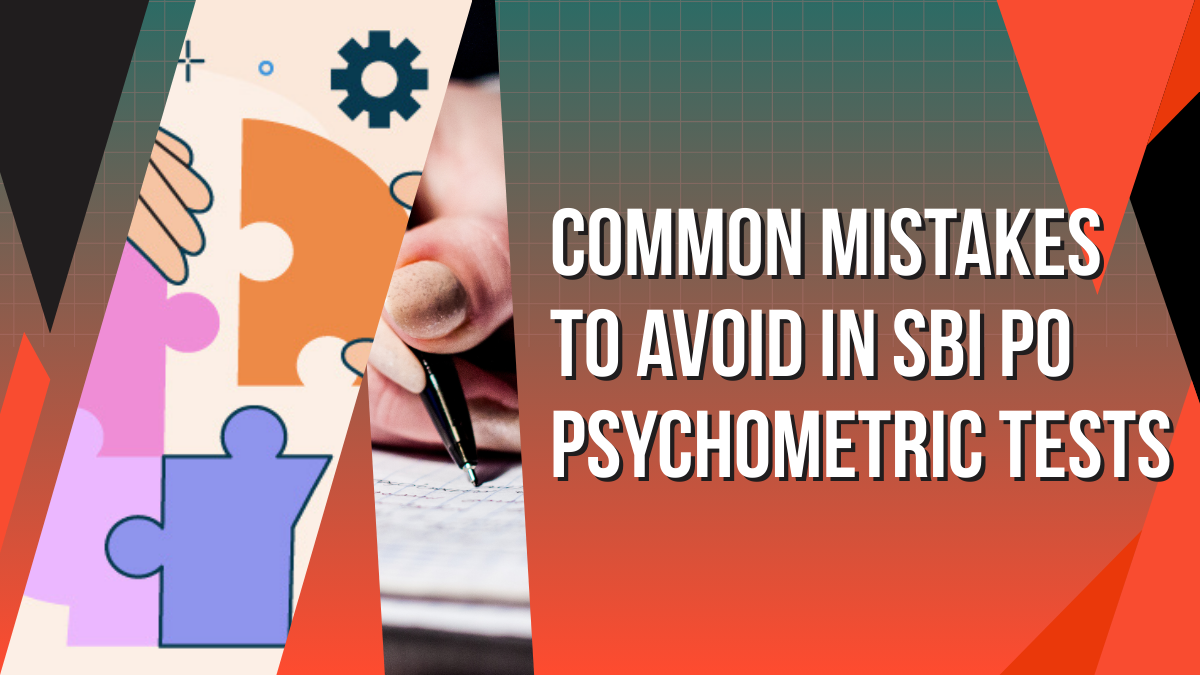The SBI PO Psychometric Test is a crucial stage in the selection process that assesses a candidate’s personality, behavior, and decision-making approach rather than academic knowledge. Many aspirants, despite having strong reasoning and aptitude skills, tend to make avoidable mistakes during this test that can affect their overall evaluation. Understanding the common errors and misconceptions beforehand can help candidates perform with clarity, confidence, and authenticity. Avoiding these pitfalls is key to showcasing a well-balanced personality aligned with the professional values expected by State Bank of India.
Common Mistakes to Avoid in SBI PO Psychometric Tests
The SBI PO psychometric test is an important component of the recruitment process that assesses the personality and suitability for the role beyond academic knowledge. Avoiding common mistakes such as misunderstanding the test’s purpose, trying to game the system, rushing through questions, and being inconsistent can significantly enhance your chances of success. Preparation through practice, self-awareness, and maintaining honesty will help you present your true self effectively, paving the way for a successful career as an SBI Probationary Officer.
1. Not Understanding the Purpose of the Psychometric Test
One of the biggest mistakes candidates make is not grasping the true purpose of the psychometric test. Unlike objective exams, this test does not have right or wrong answers in the traditional sense. It assesses your personality traits, decision-making style, and how well you fit the job profile. Approaching it like a typical exam can lead to inconsistent or insincere answers, which may raise red flags for examiners.
2. Overthinking or Trying to “Game” the Test
Many candidates try to guess what the “ideal” answers might be and tailor their responses accordingly. This approach often backfires because psychometric tests are designed to detect inconsistencies and socially desirable responding. Overthinking or attempting to manipulate answers can result in contradictory responses, reducing your credibility and chances of selection.
3. Responding Without Self-Reflection
Answering questions hastily without reflecting on your genuine preferences and behaviors is another common error. The test evaluates your natural tendencies, so it’s important to be honest and consistent. Candidates who respond based on what they think is expected rather than what truly reflects their personality may face difficulties in later stages, such as interviews or job performance.
4. Ignoring Instructions and Time Management
Though the psychometric test is not timed as strictly as other exams, ignoring instructions or rushing through questions can lead to careless mistakes. Some questions may require you to rank preferences or choose between closely related options. Failing to carefully read instructions or manage your time may cause confusion and affect the accuracy of your responses.
5. Not Practising Psychometric Tests Beforehand
Lack of practice is a critical oversight. Familiarity with the test format and types of questions can help reduce anxiety and improve confidence. Practising sample psychometric tests allows candidates to understand how to approach different question types, manage time effectively, and maintain consistency in their answers.
6. Being Inconsistent Across Similar Questions
Psychometric tests often include similar questions phrased differently to check for consistency. Providing conflicting answers to such questions can signal dishonesty or confusion. Candidates should strive to maintain consistent responses that genuinely reflect their personality and work style.
7. Neglecting to Stay Calm and Focused
Stress and nervousness can impair judgment and lead to careless errors. Candidates who fail to stay calm may rush through questions or second-guess their answers. Practicing relaxation techniques and maintaining focus during the test can improve accuracy and overall performance.
8. Failing to Align Responses with Job Role Requirements
While honesty is paramount, it is also important to understand the qualities desirable for an SBI PO. Traits such as integrity, teamwork, leadership, adaptability, and customer orientation are valued. Candidates should be mindful of these attributes and ensure their responses reflect a balanced personality suited for the responsibilities of a probationary officer.
Common Reasons for Rejection at This Stage
While the psychometric test doesn’t have traditional pass or fail criteria, certain response patterns and profiles consistently lead to rejection. Understanding these rejection triggers helps candidates avoid inadvertent elimination despite having strong technical qualifications and banking aptitude.
- Extreme Response Patterns: Consistently selecting only the most extreme options (strongly agree/strongly disagree) across all questions suggests inflexibility and black-and-white thinking. Banking requires nuanced decision-making and the ability to see multiple perspectives, especially when dealing with diverse customers and complex financial situations.
- Low Stress Tolerance Indicators: Responses suggesting inability to handle pressure, frequent emotional reactions to workplace challenges, or avoidance of responsibility during difficult situations. The banking sector involves high-stakes decisions, regulatory scrutiny, and demanding customers, making stress resilience essential.
- Poor Team Collaboration Scores: Profiles indicating strong preference for isolated work, difficulty accepting feedback, or reluctance to support colleagues. Modern banking operates through collaborative teams, cross-functional projects, and shared accountability structures.
- Integrity and Ethics Red Flags: Any responses suggesting willingness to bend rules for personal gain, hide mistakes from supervisors, or prioritize personal interests over customer welfare. Given the fiduciary responsibility of banking roles, even minor integrity concerns can result in immediate rejection.
- Excessive Aggressiveness or Passivity: Profiles showing either overly aggressive sales approaches that might pressure customers inappropriately, or extreme passivity that suggests inability to meet targets or advocate for bank interests when necessary.
- Customer Service Incompatibility: Responses indicating impatience with repetitive questions, frustration with less knowledgeable customers, or preference for minimal human interaction. Banking success depends heavily on positive customer relationships and service excellence.
- Risk-Taking Extremes: Either excessive risk aversion that might prevent necessary business decisions, or dangerous risk appetite that could expose the bank to unnecessary losses. Banks need employees who can balance prudent risk management with business growth objectives.
Strategic Recommendations for Success
Success in the SBI PO psychometric test requires a balanced approach that combines adequate preparation. Developing self-awareness through reflection on personal values, work preferences, and behavioural patterns provides a solid foundation for consistent, authentic responses. Consider seeking feedback from colleagues, supervisors, or mentors about your professional strengths and areas for development.
How to Approach the Psychometric Test with the Right Mindset
To perform well in the SBI PO Psychometric Test, candidates should stay calm, genuine, and self-aware to reflect their true personality and professional values. Key Points to Remember:
- Stay relaxed and confident throughout the test.
- Read each statement carefully before responding.
- Avoid guessing or overthinking the answer instinctively.
- Be honest and consistent in your responses.
- Reflect traits like integrity, teamwork, and leadership.
- Don’t try to create a “perfect” image; focus on authenticity.
- Prepare through self-reflection to understand your behaviour patterns.
- Maintain a positive and balanced outlook in every answer.
| Related Posts | |
| SBI PO Psychometric Test Admit Card | Questions Asked in SBI PO Psychometric Test |
| What is Psychometric Test in SBI PO? | Why SBI Conducts a Psychometric Test |





 CAIIB Exam Date 2026 Out for June & ...
CAIIB Exam Date 2026 Out for June & ...
 NICL Assistant Cut Off 2026, Check Previ...
NICL Assistant Cut Off 2026, Check Previ...
 RBI Issues Draft Guidelines on Forex Dea...
RBI Issues Draft Guidelines on Forex Dea...








